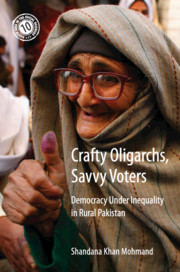Book contents
- Frontmatter
- Dedication
- Contents
- List of Tables and Figures
- Acknowledgements
- Glossary of Local Terms
- 1 Introduction: Rural Voters under Inequality in an Emerging Democracy
- 2 Colonial Constructs and Post-colonial Politics: 1849–2018
- 3 Landed Power in Sahiwal: From Domination to Intermediation
- 4 Local Competition and Bargaining Power: Conceptualising Political Engagement in Rural Punjab
- 5 Bargaining with Landlords: Comparing Political Engagement in Unequal Contexts
- 6 Structural Inequality and Variations in Political Engagement
- 7 When Do Shifts in Political Engagement Occur?
- 8 Conclusion: The Future of Pakistan's Democracy
- Annex 1 Chronology of Political Events in Pakistan
- Annex 2 Index of Political Engagement (IPE) Scores for 38 Villages
- Annex 3 Research Instruments
- Annex 4 Detailed Descriptions of Household Variables Used in Multivariate Regression Analysis
- Bibliography
- Index
2 - Colonial Constructs and Post-colonial Politics: 1849–2018
Published online by Cambridge University Press: 26 April 2019
- Frontmatter
- Dedication
- Contents
- List of Tables and Figures
- Acknowledgements
- Glossary of Local Terms
- 1 Introduction: Rural Voters under Inequality in an Emerging Democracy
- 2 Colonial Constructs and Post-colonial Politics: 1849–2018
- 3 Landed Power in Sahiwal: From Domination to Intermediation
- 4 Local Competition and Bargaining Power: Conceptualising Political Engagement in Rural Punjab
- 5 Bargaining with Landlords: Comparing Political Engagement in Unequal Contexts
- 6 Structural Inequality and Variations in Political Engagement
- 7 When Do Shifts in Political Engagement Occur?
- 8 Conclusion: The Future of Pakistan's Democracy
- Annex 1 Chronology of Political Events in Pakistan
- Annex 2 Index of Political Engagement (IPE) Scores for 38 Villages
- Annex 3 Research Instruments
- Annex 4 Detailed Descriptions of Household Variables Used in Multivariate Regression Analysis
- Bibliography
- Index
Summary
A good place to start a story is at the beginning. In the case of land inequality and the power of landed groups in the politics of rural Punjab, this beginning is the annexation of Punjab by the British colonial state in 1849, which, according to Gazdar, ‘can be seen as the point of departure for any historical analysis of land’ (2009, 6). The institutional and administrative reforms that followed this annexation took Punjab from being ‘a land of small peasant proprietors’ to a province where by the end of colonial rule in 1947 ‘less than 4 per cent of the agricultural population owned more than 50 per cent of the land while poor peasants, landless sharecroppers and agricultural labourers accounted for 80 per cent of the population’ (Hamid 1982, 52). In this chapter, I argue that in meeting the main goals of Empire in Punjab – the maintenance of law and order, and the creation and expansion of a revenue base – the colonial state changed the nature of Punjabi villages and created economic and social hierarchies that continue to determine the pattern of politics in these villages to this day. The colonial reforms and events I describe here shaped most of the factors whose influence on rural politics I analyse in later chapters. The colonial creation of a powerful, rural landed elite also affected the nature of post-colonial national politics, which I recount in later parts of the chapter.
Creating a ‘traditional’ landed elite under colonial rule: 1849–1947
Soon after its annexation of Punjab in 1849 the British colonial state set about implementing some key reforms. The basic aim of these was not different from what Young described as the objective of colonialism in Africa – to construct ‘institutions of domination with improvised resources … [and] simultaneously to create agencies of rule and to invent extractive devices imposing on the subordinated societies the cost of the unsolicited governance proposed for them’ (1994, 78). In Punjab the colonial state had three main aims: (a) establish a revenue base and extract resources to fund the administrative apparatus of the state, including the army, (b) maintain local law and order and create ‘agencies of rule’, and (c) expand the revenue base over time.
- Type
- Chapter
- Information
- Crafty Oligarchs, Savvy VotersDemocracy under Inequality in Rural Pakistan, pp. 49 - 84Publisher: Cambridge University PressPrint publication year: 2019



